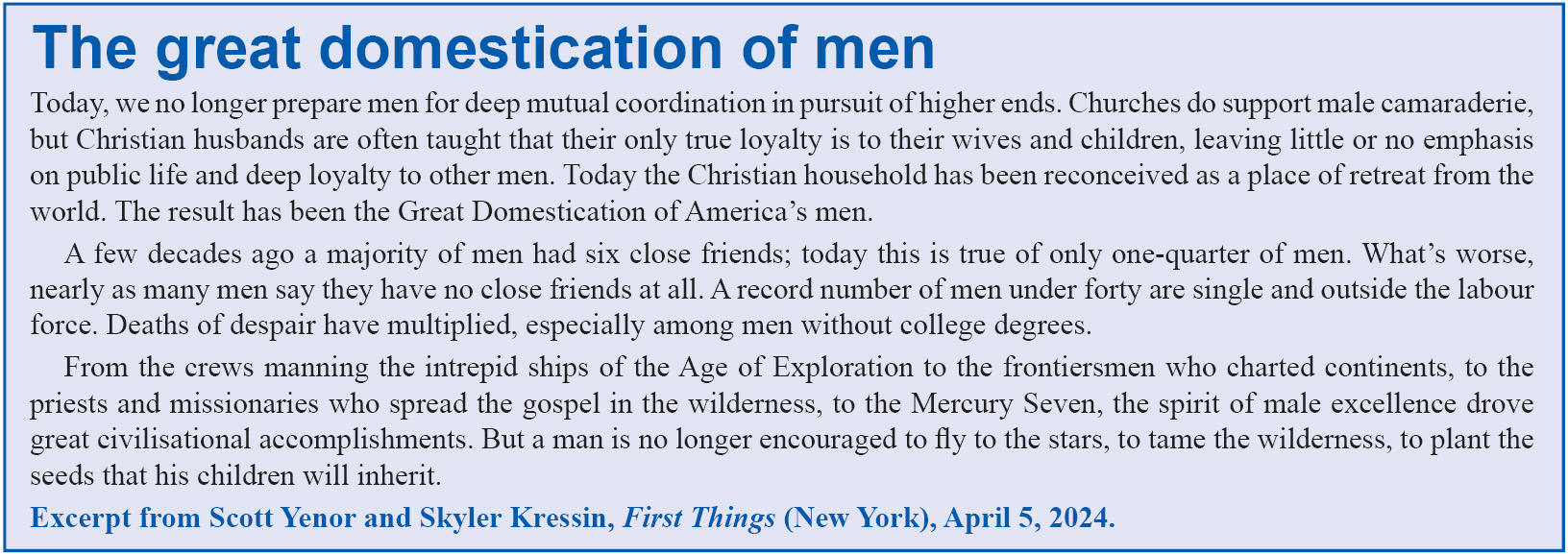Who will stand up for men and boys? by Bill Muehlenberg
 In the increasingly toxic West, where its enemies are working overtime to deconstruct and delegitimise everything, the core institutions of marriage and family have been taking a real beating, with everyone the loser: men, women, boys and girls.
In the increasingly toxic West, where its enemies are working overtime to deconstruct and delegitimise everything, the core institutions of marriage and family have been taking a real beating, with everyone the loser: men, women, boys and girls.
I have spoken about all four groups often enough, but here I return to what can so routinely be ignored and neglected: the fate of males. The war on "toxic masculinity" has been one of the more recent expressions — and justifications — for this. So pervasive and harmful has all this been, that those who seek to address it — people such as Jordan Peterson — are mobbed wherever they go.
Young men especially need to hear such messages and words of support. All they have heard for far too long is how bad they are, simply by default. How many lives have literally been saved by the talks of Dr Peterson is an open question; but he is constantly inundated with reports from boys and young men saying they have been so very much helped by his words.
Here I want to look at one other author who has done much on this topic of late. Brenda Hafera, of the American-based Heritage Foundation, has penned a short article along with a 32-page research report on how males, at least in America, are faring — and it is not a very pretty picture.
Let me speak to each of her pieces. In an article published on March 26 she summarises the findings of her longer report. In both publications she reminds us of key works which we would do well to revisit. We need to pull from our shelves and re-read such classics as The War Against Boys: How Misguided Policies are Harming Our Young Men by Christina Hoff Sommers (Simon & Schuster, 2000) and The Boy Crisis: Why Our Boys are Struggling and What We Can Do About It by Warren Farrell and John Gray (BenBella Books, 2018).
In her brief essay, she opens with these words: "Many boys and men are struggling to flourish in their roles as sons, students, employees, and fathers, and to achieve the sense of purpose that comes from being rooted within marriages, communities, churches, and country. Much of the literature on the boy crisis contains impressive, even essential social science work that clearly demonstrates that boys and men are falling behind."
After summarising some of her findings, she says:
"For much of history, human beings have been most willing to give the last measure of their devotion for what truly provides identity: God, family and country. Each of these encompasses the individual, pulling him out of himself and toward a life of sacrifice, responsibility and devotion. Expressive individualism is a stark deviation from the traditional understanding that freedom and virtue are intertwined."
"Expressive individualism," according to Hafera, was articulated in a collection of essays, first published in 1985, Habits of the Heart: Individualism and Commitment in American Life:
"…influenced by modern psychological ideals, to be free is not simply to be left alone by others; it is also somehow to be your own person in the sense that you have defined who you are, decided for yourself what you want out of life, free as much as possible from the demands of conformity to family, friends, or community."
She warns:
"Solutions to the boy crisis must counteract such messaging and ideas, putting forth a substantive view of marriage, revitalising religious institutions, and honouring fatherhood and male mentorship as fundamental sources of meaning. They will re-establish a proper understanding of the human person and the ties between happiness and virtue. Sadly, there are no silver bullet solutions to these issues. The devastation is far-reaching and multitudinous, and the work we have to do matches the price we have paid." [Source: Brenda M. Hafera, "The tailspin of American boys and men", The American Conservative, March 26, 2024.]
But let me now turn to her research report, Men Without Meaning: The Harmful Effects of Expressive Individualism (March 19, 2024), and offer some highlights from it. It begins:
"Men and boys are struggling mentally, physically, academically, economically and spiritually because of the absence of fathers, the failures of our education system and policies, and changes in both the job market and our culture. Playing a key role behind the scenes is expressive individualism, a radical autonomy that replaces the embodied relational person, connected to family and human nature, with the isolated psychological self who constructs his or her own morality. Solutions to the boy crisis must encourage relationships rather than personal licence. They must repair the ties between inalienable rights and their accompanying duties ... and better situate the individual within the broader social matrices that truly shape him: God, family and country."Millions of boys and men in America are unmoored, if not lost. In both subtle and not-so-subtle ways, they are told they are unneeded. Boys find themselves in classrooms that seem designed to frustrate them. Single men live in their mom's basements playing video games. Those who marry become the dolt detached dad starring as the lead in Everybody Loves Raymond."
Consider just two specific areas. While dads are considered by many today to be superfluous, or fully replaceable by females, the research has long clearly stated otherwise. Simply think about the role dads provide when it comes to play:
"While dads contribute in many ways to the raising of children, play is particularly important for childhood development because it 'permits the young brain to remain flexible, enabling it to react to an immense variety of potential stimuli'. Play begins when a baby is around six to nine months old. Think of the belly laugh that erupts from a toddler as dad throws his child up into the air, seemingly testing the bounds of safety but always maintaining control. Not something to be treated as frivolous, play is essential to regulating and channeling impulses and learning the confines of the human body. The developmental benefits include 'enhanced physical fitness and improved cognitive, emotional and social function'.
"Strikingly, mammals 'that are deprived of play won't develop to their full capacity'. While it is essential for all children, by preschool, boys can be particularly active, aggressive, impulsive, demanding and adventurous and have a tendency to dominate peers; play is a means of properly directing those instincts."Through play, children are constantly testing and expanding their limits and overcoming challenges, often with dad's encouragement. Play is a means of strengthening the bond between a father and child, and 'fathers play a particularly important role in the development of children's openness to the world'. Fathers tend to play more actively with their children; spend more time proportionally than mothers do playing with their children; and — particularly for boys — become the playmate of choice as motor skills develop."This is not to discount or diminish the role of mothers, but to highlight the balancing role of fathers for children…"
One other topic worth noting: technology. She writes:
"Not all screens are created equal. Some of the effects of screen time are problematic because of the content (like pornography and much of social media), but all screen time is detrimental insofar as it removes individuals from the real world. It promotes the expressive individualism tenet that we are disembodied selves."The amount of time men not in the workforce are spending in front of screens is staggering. Non-working men spend an average of 5.5 hours per day watching television and movies. The allure of video games has increased as they have become more engaging and addictive. Hours spent in front of a screen are hours spent not engaging in another activity. From 1981 to 1997, 'time spent in any kind of play went down 16% overall, and much of the play had shifted to indoor activities, often involving a computer and no other children.
This kind of play does not build physical strength and is not as effective at building psychological resilience or social competence'."In the modern era, screen time also includes online pornography, which is having a disturbing and disquieting impact on our boys. Pornography use is so widespread that when one group of researchers sought to conduct a study of its effects, 'they were unable to find enough men in their twenties who had not watched porn to form a control group'. According to some, Gen Z boys are exposed on average at the age of nine, and the British Journal of School Nursing reports that 'children under 10 now account for 22 percent of online porn consumption under 18'."
In her conclusion Hafera offers some practical steps that can be taken to turn all this around:
"The crisis of men and boys shows up at each stage of life: boyhood, adolescence and adulthood. Dad deprivation is the primary cause, though education policies and economic shifts have contributed in exacerbating and unique ways. Men and boys are struggling mentally, physically, academically, economically and spiritually."The solutions to the boy crisis will be far-reaching and multitudinous, including policies that may not immediately seem obviously relevant to the boy crisis."
Hafera proposes the following:
• Promoting school choice and classical and civic
education;
• Disrupting the accreditation monopoly;
• Reforming colleges and universities;
• Increasing vocational and apprenticeship programs;
• Invigorating mentorship and single-sex activities and spaces;
• Renewing positive media portrayals and societal
respect for men and fatherhood; and
• Establishing and revisiting age-appropriate
curtailments on technologies, drug policies,
welfare and disability regulations, and family law.
[Source: Brenda M. Hafera's 32-page report, Men
Without Meaning: The Harmful Effects of Expressive
Individualism (Heritage Foundation, Washington,
DC), March 19, 2024, available free online.]
Needless to say, all this is fully documented. All up there are 116 endnotes found here. We can be thankful for folks such as Hafera in keeping us up to date on the latest battlefronts in this regard. Very few are dealing with all this, so we need more champions like her.
As mentioned, there is of course also a major war on girls and women. Just think how the trans militants are working overtime to rid the world of women. But we need to fight these battles on all levels, and standing up for boys and men must also be high on our agenda.
Bill Muehlenberg is an American-born Christian apologist, ethicist and cultural commentator, who lives in Melbourne. He has written a number of books, including Strained Relations: The Challenge of Homosexuality (2011), The Challenge of Abortion (2015) and The Challenge of Euthanasia (2016). The above article is reprinted, with the author's permission, from his website, CultureWatch, at: BillMuehlenberg.com

